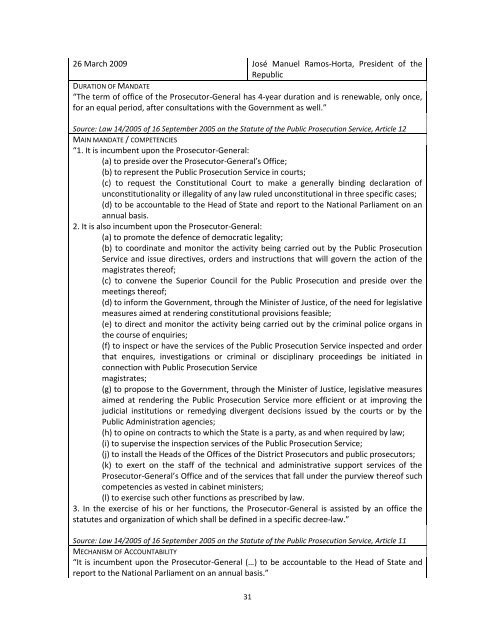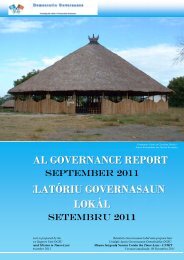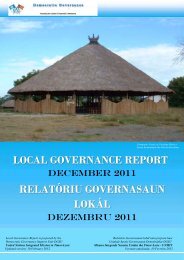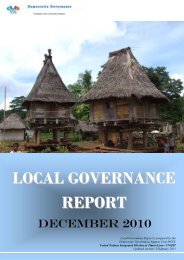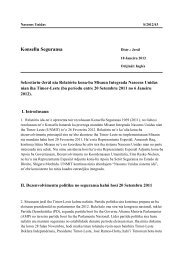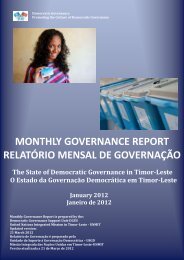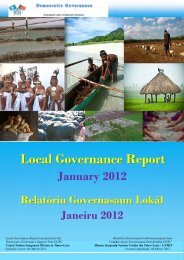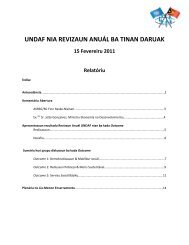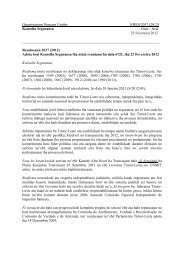Key Institutions Report final 15 December 2011 - Unmit
Key Institutions Report final 15 December 2011 - Unmit
Key Institutions Report final 15 December 2011 - Unmit
You also want an ePaper? Increase the reach of your titles
YUMPU automatically turns print PDFs into web optimized ePapers that Google loves.
26 March 2009 José Manuel Ramos-Horta, President of the<br />
Republic<br />
DURATION OF MANDATE<br />
“The term of office of the Prosecutor-General has 4-year duration and is renewable, only once,<br />
for an equal period, after consultations with the Government as well.”<br />
Source: Law 14/2005 of 16 September 2005 on the Statute of the Public Prosecution Service, Article 12<br />
MAIN MANDATE / COMPETENCIES<br />
“1. It is incumbent upon the Prosecutor-General:<br />
(a) to preside over the Prosecutor-General’s Office;<br />
(b) to represent the Public Prosecution Service in courts;<br />
(c) to request the Constitutional Court to make a generally binding declaration of<br />
unconstitutionality or illegality of any law ruled unconstitutional in three specific cases;<br />
(d) to be accountable to the Head of State and report to the National Parliament on an<br />
annual basis.<br />
2. It is also incumbent upon the Prosecutor-General:<br />
(a) to promote the defence of democratic legality;<br />
(b) to coordinate and monitor the activity being carried out by the Public Prosecution<br />
Service and issue directives, orders and instructions that will govern the action of the<br />
magistrates thereof;<br />
(c) to convene the Superior Council for the Public Prosecution and preside over the<br />
meetings thereof;<br />
(d) to inform the Government, through the Minister of Justice, of the need for legislative<br />
measures aimed at rendering constitutional provisions feasible;<br />
(e) to direct and monitor the activity being carried out by the criminal police organs in<br />
the course of enquiries;<br />
(f) to inspect or have the services of the Public Prosecution Service inspected and order<br />
that enquires, investigations or criminal or disciplinary proceedings be initiated in<br />
connection with Public Prosecution Service<br />
magistrates;<br />
(g) to propose to the Government, through the Minister of Justice, legislative measures<br />
aimed at rendering the Public Prosecution Service more efficient or at improving the<br />
judicial institutions or remedying divergent decisions issued by the courts or by the<br />
Public Administration agencies;<br />
(h) to opine on contracts to which the State is a party, as and when required by law;<br />
(i) to supervise the inspection services of the Public Prosecution Service;<br />
(j) to install the Heads of the Offices of the District Prosecutors and public prosecutors;<br />
(k) to exert on the staff of the technical and administrative support services of the<br />
Prosecutor-General’s Office and of the services that fall under the purview thereof such<br />
competencies as vested in cabinet ministers;<br />
(l) to exercise such other functions as prescribed by law.<br />
3. In the exercise of his or her functions, the Prosecutor-General is assisted by an office the<br />
statutes and organization of which shall be defined in a specific decree-law.”<br />
Source: Law 14/2005 of 16 September 2005 on the Statute of the Public Prosecution Service, Article 11<br />
MECHANISM OF ACCOUNTABILITY<br />
“It is incumbent upon the Prosecutor-General (…) to be accountable to the Head of State and<br />
report to the National Parliament on an annual basis.”<br />
31


